The Cotton Club
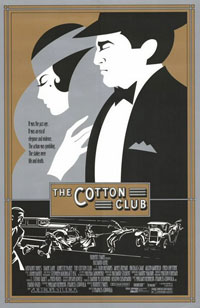 Playing like a cross between Once Upon a Time in America and Purple Rain, with a script by Francis Ford Coppola and the great Albany novelist William Kennedy (author of the depressing Depression classic Ironweed), based on a story the two concocted with The Godfather author himself Mario Puzo, director Coppola’s gangster/Jazz epic The Cotton Club surprisingly fits in less with his Godfather saga, but stands up perfectly with his “experiments in style” phase he’s worked on ever since burning-out after his masterpiece Apocalypse Now in ’79. While The Cotton Club’s two beautiful leads, Richard Gere and Diane Lane, are only able to deliver two-dimensional performances, luckily the brilliant supporting cast (led by the wonderful long-time character bad-guy actor James Remar) manages to bring a third dimension to the acting, helping to keep the film more than watchable. Aside from the acting, gorgeous cinematography, and production design from big names in their fields, cameraman Stephen Goldblatt (The Hunger) and superstar set designer, Richard Sylbert (The Graduate, Chinatown, Rosemary’s Baby, etc.), is the music and musical performances led by tap-man extraordinaire Gregory Hines (History of the World: Part 1) and a number of outstanding re-creations of the era's legends including Duke Ellington and Cab Calloway. The Cotton Club’s production history was mired by nightmares and legal problems (ranging from drug issues to murder) which may explain why the final product may feel a little cluttered or chaotic, but that said, it still holds up as a damn fascinating piece of entertainment.
Playing like a cross between Once Upon a Time in America and Purple Rain, with a script by Francis Ford Coppola and the great Albany novelist William Kennedy (author of the depressing Depression classic Ironweed), based on a story the two concocted with The Godfather author himself Mario Puzo, director Coppola’s gangster/Jazz epic The Cotton Club surprisingly fits in less with his Godfather saga, but stands up perfectly with his “experiments in style” phase he’s worked on ever since burning-out after his masterpiece Apocalypse Now in ’79. While The Cotton Club’s two beautiful leads, Richard Gere and Diane Lane, are only able to deliver two-dimensional performances, luckily the brilliant supporting cast (led by the wonderful long-time character bad-guy actor James Remar) manages to bring a third dimension to the acting, helping to keep the film more than watchable. Aside from the acting, gorgeous cinematography, and production design from big names in their fields, cameraman Stephen Goldblatt (The Hunger) and superstar set designer, Richard Sylbert (The Graduate, Chinatown, Rosemary’s Baby, etc.), is the music and musical performances led by tap-man extraordinaire Gregory Hines (History of the World: Part 1) and a number of outstanding re-creations of the era's legends including Duke Ellington and Cab Calloway. The Cotton Club’s production history was mired by nightmares and legal problems (ranging from drug issues to murder) which may explain why the final product may feel a little cluttered or chaotic, but that said, it still holds up as a damn fascinating piece of entertainment.
The massive plot goes something like this... Harlem 1928, hipster clarinetist Dixie Dwyer (Gere), hopes to get hired on at the legendary Cotton Club, but after accidentally saving the life of tough guy gangster Dutch Schultz (Remar), he becomes his boy, appreciated but under his control. Things get dangerous when he falls for Dutch’s girlfriend, Vera (Lane), and they carry on an affair behind his back. Cotton Club owner Owney Madden (Bob Hoskins) and his boyfriend Frenchy Demange (Fred Gwynne AKA Herman Munster) are above Dutch on the underworld food chain, they try to keep him under control but he proves just too psychotic to manage. Meanwhile a black gangster, Bumpy Rhodes (Laurence Fishburne), tries to make an inroad on Harlem’s white controlled crime scene as does Dixie’s ambitious trigger happy little brother Vincent (Nicolas Cage). The battle for the soul of Harlem all leads to lots of gun play and violence between black, Jewish, Irish and Italian gangsters.
Terms of Endearment
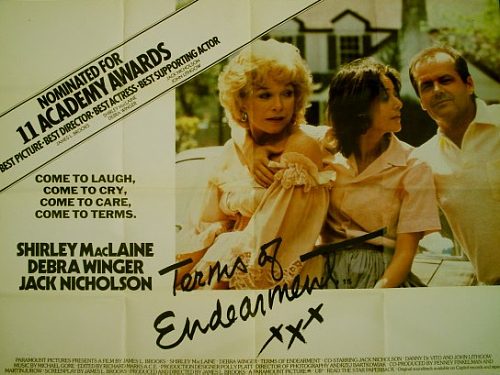 Sometimes films about women are unfairly called “chick flicks,” or more recently, if it involves illness, it can be written off as a Lifetime flick or disease-of-the-week TV movie. Terms of Endearment is neither, though it’s sometimes too elegantly clean in its look; in its heart it’s a big, complicated story with multi- dimensional characters that works perfectly as both a smart comedy and a moving drama. Following mother and daughter, Aurora (Shirley MacLaine) and Emma (Debra Winger) over decades, their tricky relationship to each other and others, like a ‘70s-style flick, sometimes it’s hard to like these women or fully understand their motives, just like real people, not movie creations. Besides MacLaine and Winger giving the performances of their careers, the film is loaded with pedigree behind it. Making his directing debut is the legendary TV writer and creator, James L. Brooks (The Mary Tyler Moore Show, Lou Grant,Taxi) and it has his now familiar fingerprints on every frame. Brooks also wrote the script, based on a book by the great novelist Larry McMurtry (Hud, The Last Picture Show, Lonesome Dove). It was shot by the respected Polish cinematographer Andrzej Bartkowiak (Prince of the City, The Verdict), the crisp look now the standard for these kinds of movies. The great Polly Platt (Paper Moon) designed it, Richard Marks (The Godfather Part II) was the editor, and Michael Gore (Fame) provides the dainty score. Oh, and in a big supporting performance Jack Nicholson wanders in and devours the screen, brilliantly.
Sometimes films about women are unfairly called “chick flicks,” or more recently, if it involves illness, it can be written off as a Lifetime flick or disease-of-the-week TV movie. Terms of Endearment is neither, though it’s sometimes too elegantly clean in its look; in its heart it’s a big, complicated story with multi- dimensional characters that works perfectly as both a smart comedy and a moving drama. Following mother and daughter, Aurora (Shirley MacLaine) and Emma (Debra Winger) over decades, their tricky relationship to each other and others, like a ‘70s-style flick, sometimes it’s hard to like these women or fully understand their motives, just like real people, not movie creations. Besides MacLaine and Winger giving the performances of their careers, the film is loaded with pedigree behind it. Making his directing debut is the legendary TV writer and creator, James L. Brooks (The Mary Tyler Moore Show, Lou Grant,Taxi) and it has his now familiar fingerprints on every frame. Brooks also wrote the script, based on a book by the great novelist Larry McMurtry (Hud, The Last Picture Show, Lonesome Dove). It was shot by the respected Polish cinematographer Andrzej Bartkowiak (Prince of the City, The Verdict), the crisp look now the standard for these kinds of movies. The great Polly Platt (Paper Moon) designed it, Richard Marks (The Godfather Part II) was the editor, and Michael Gore (Fame) provides the dainty score. Oh, and in a big supporting performance Jack Nicholson wanders in and devours the screen, brilliantly.
The wealthy widow Aurora is a deeply caring but overly needy mother to her only daughter, Emma. She doesn’t approve of Emma’s choice of husband, the skirt-chasing college professor Flap Horton (Jeff Daniels) who drags Emma from one sleepy Midwest college town after another and, over the course of several years, they have three kids together. While a half-assed father, he usually also has an attractive young coed on the side. Everything Emma does doesn’t seem to meet Aurora’s high expectations; out of desperation and loneliness in her lousy marriage she even has a brief affair with a nerdy married banker (John Lithgow, who had become a major character actor after a bravura performance in The World According to Garp).
There Will Be Blood
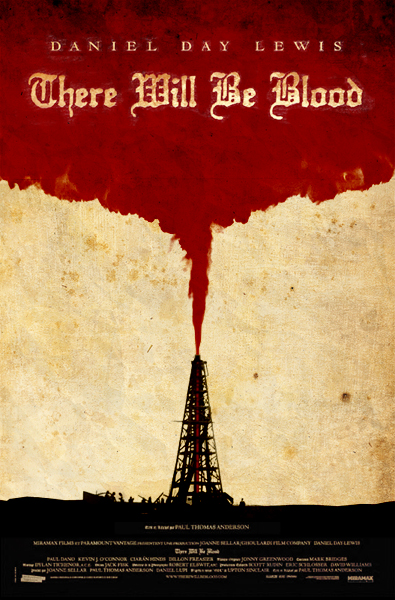 For director/writer Paul Thomas Anderson, his first film Hard Eight was a solid gambling thriller while Punch-Drunk Love gave him quirky Lynchian street cred, but it was his double dose of sprawling LA ensemble pieces Magnolia and Boogie Nights that put him in the big, big-time. Though those are two dazzlingly shot and acted flicks, there is a sense of Altman-esqe gimmickry and MapQuest symmetry about them. It really was his fifth feature, There Will Be Blood, which made Anderson more then just a hip taste of the day. Apparently the film was partially inspired by Upton Sinclair’s 1927 novel, Oil!, with the setting moved from the 1920s to the turn of the century. The film works best when sticking to the source material, detailing the beginnings of the oil boom; it tends to loose itself when veering off-course into Anderson’s morality battle. Regardless, it’s always watchable thanks first and foremost to the epic performance from the great Irish actor Daniel Day-Lewis, who channels the voice, look, and attitude of director/actor John Huston (even more accurately then Clint Eastwood did in White Hunter Black Heart). There Will Be Blood proves that when Anderson has the right, focused material he has as much clear-eyed vision as anyone making movies these days.
For director/writer Paul Thomas Anderson, his first film Hard Eight was a solid gambling thriller while Punch-Drunk Love gave him quirky Lynchian street cred, but it was his double dose of sprawling LA ensemble pieces Magnolia and Boogie Nights that put him in the big, big-time. Though those are two dazzlingly shot and acted flicks, there is a sense of Altman-esqe gimmickry and MapQuest symmetry about them. It really was his fifth feature, There Will Be Blood, which made Anderson more then just a hip taste of the day. Apparently the film was partially inspired by Upton Sinclair’s 1927 novel, Oil!, with the setting moved from the 1920s to the turn of the century. The film works best when sticking to the source material, detailing the beginnings of the oil boom; it tends to loose itself when veering off-course into Anderson’s morality battle. Regardless, it’s always watchable thanks first and foremost to the epic performance from the great Irish actor Daniel Day-Lewis, who channels the voice, look, and attitude of director/actor John Huston (even more accurately then Clint Eastwood did in White Hunter Black Heart). There Will Be Blood proves that when Anderson has the right, focused material he has as much clear-eyed vision as anyone making movies these days.
Spanning decades in the life and career of Daniel Plainview (Day-Lewis), a prospector who gets into the oil game, the films opens with a stunning dialogue-free 15 minutes as Plainview digs for oil and adopts a baby boy from a worker who was killed. He has a knack for finding oil and becomes more and more successful. Though he is a greedy manipulator he seems to be a devoted dad, referring to his son as his business partner. However, after the kid goes deaf in an on-site accident he seems to lose his patience for fathering. Getting a tip from a young man named Paul Sunday (Paul Dano) about a piece of land that may have oil, he swindles the family out of their land and gets very rich with the oil he takes from their ground. Unfortunately, Paul’s twin brother Eli (also Dano, which at first seems confusing) is a true believer preacher who becomes a lifelong headache for the faithless entrepreneur. He also is joined briefly by a guy claiming to be his long-lost half brother (Kevin J. O’Connor) and has minor spats with the major oil companies.
Reds
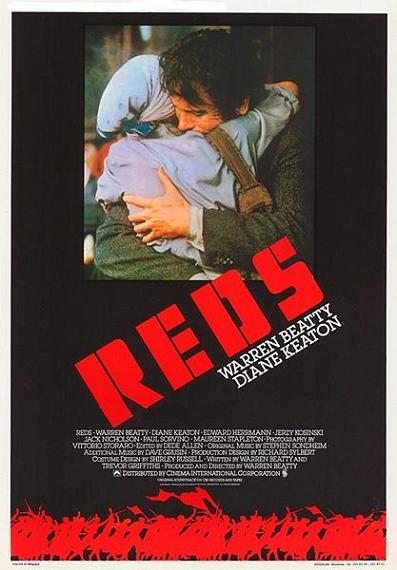 In 1981, with newly elected rah-rah American president Ronald Reagan taking office, an anti-Communist, anti-Soviet ardor was in full swing. So it was extra amazingly audacious that pretty-boy actor Warren Beatty was able to get his giant bio of Communist journalist John Reed made. Reed, the only American buried in Russia’s Kremlin, isn’t exactly a household name and Reds the movie, clocking in at an epic 194 minutes, wasn’t exactly a sure thing at the box-office (matter of fact, despite winning a bunch of awards, it was considered a financial disappointment in its day). Reds really is a tribute to the passion of Warren Beatty’s grand vision; he produced, directed, and co-wrote the screenplay with British playwright Trevor Griffiths (with uncredited contributions from Elaine May) and managed to put together an impressive cast to back him up (Diane Keaton, Jack Nicholson, Edward Herrmann, Paul Sorvino, Maureen Stapleton, Gene Hackman, etc). Ironic: a rich movie star makes a big expensive movie (with corporate funds) about an anti-wealth guy. In the Doctor Zhivago tradition, Reds is one of those sweeping literate love stories which was shot for over a year in five different countries; but underneath that sweep it’s a very personal and intimate little movie.
In 1981, with newly elected rah-rah American president Ronald Reagan taking office, an anti-Communist, anti-Soviet ardor was in full swing. So it was extra amazingly audacious that pretty-boy actor Warren Beatty was able to get his giant bio of Communist journalist John Reed made. Reed, the only American buried in Russia’s Kremlin, isn’t exactly a household name and Reds the movie, clocking in at an epic 194 minutes, wasn’t exactly a sure thing at the box-office (matter of fact, despite winning a bunch of awards, it was considered a financial disappointment in its day). Reds really is a tribute to the passion of Warren Beatty’s grand vision; he produced, directed, and co-wrote the screenplay with British playwright Trevor Griffiths (with uncredited contributions from Elaine May) and managed to put together an impressive cast to back him up (Diane Keaton, Jack Nicholson, Edward Herrmann, Paul Sorvino, Maureen Stapleton, Gene Hackman, etc). Ironic: a rich movie star makes a big expensive movie (with corporate funds) about an anti-wealth guy. In the Doctor Zhivago tradition, Reds is one of those sweeping literate love stories which was shot for over a year in five different countries; but underneath that sweep it’s a very personal and intimate little movie.
After covering events in Russia, journalist John Reed (Beatty) returns to his home town of Portland to raise money for his ultra-left newspaper. There, he meets and has a fling with a married socialite named Louise Bryant (Keaton) and invites her back to New York's bohemian Greenwich Village where they both hang with many of the famous radicals of their day, like the outspoken anarchist Emma Goldman (Stapleton). Reed encourages Bryant to become a writer herself; she develops her own form of ahead-of- her-time feminism while he throws himself deeper into the Communist Party. After the couple moves to Provincetown, Massachusetts, Reed travels the country to cover the presidential election, while Bryant begins an affair with Reed’s friend, the tortured playwright Eugene O’Neill (Nicholson), the one intellectual who seems to respect her. Then, Reed and Bryant patch things up and first travel to write about the war in Europe (that would be WWI) and then to cover the revolution in Russia of 1917. And that’s just the first half.
Schindler's List
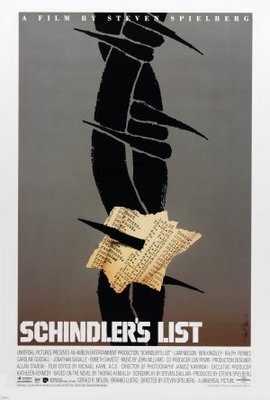 Can a film’s reputation for high quality and moral weightiness make the act of watching it a daunting experience? Actually no, 20 years later, Schindler’s List may have a high-hatted standing as an important event film that must be seen because of some kind of personal solemnity, but like Citizen Kane, it may sound like drudgery, but Schindler’s List isn’t homework. And though the subject matter is utterly disturbing and even depressing, it’s so well made, so well acted and so well crafted that for this viewer, my most recent experience watching it was completely dazzling, not to mention absorbing and even entertaining. The film also gets some undeserved contempt and jeers because Mr. Blockbuster himself, Steven Spielberg, was the director. Some see it as an attempt at self-seriousness from a guy who has prided himself on his Peter Pan complex (even making the worst Peter Pan flick of all time, Hook), but why can’t the little boy grow up and evolve? Not since The Beatles put out “Sgt. Pepper's Lonely Hearts Club Band” has an artist’s evolutionary step been so massive. Back in 1993 Schindler’s List was screened during the Oscar friendly Christmas season, when just some months earlierSpielberg had released his live-action video game Jurassic Park. One film is a shallow CGI-created attempt at cheap thrills while the other is a painstakingly rendered and emotionally devastating nightmare. Dare I say it? No matter what you think or think you’ve heard Schindler’s List is a masterpiece, one of the best films of the last 25 years.
Can a film’s reputation for high quality and moral weightiness make the act of watching it a daunting experience? Actually no, 20 years later, Schindler’s List may have a high-hatted standing as an important event film that must be seen because of some kind of personal solemnity, but like Citizen Kane, it may sound like drudgery, but Schindler’s List isn’t homework. And though the subject matter is utterly disturbing and even depressing, it’s so well made, so well acted and so well crafted that for this viewer, my most recent experience watching it was completely dazzling, not to mention absorbing and even entertaining. The film also gets some undeserved contempt and jeers because Mr. Blockbuster himself, Steven Spielberg, was the director. Some see it as an attempt at self-seriousness from a guy who has prided himself on his Peter Pan complex (even making the worst Peter Pan flick of all time, Hook), but why can’t the little boy grow up and evolve? Not since The Beatles put out “Sgt. Pepper's Lonely Hearts Club Band” has an artist’s evolutionary step been so massive. Back in 1993 Schindler’s List was screened during the Oscar friendly Christmas season, when just some months earlierSpielberg had released his live-action video game Jurassic Park. One film is a shallow CGI-created attempt at cheap thrills while the other is a painstakingly rendered and emotionally devastating nightmare. Dare I say it? No matter what you think or think you’ve heard Schindler’s List is a masterpiece, one of the best films of the last 25 years.
Though Spielberg made some truly great films:Jaws, Close Encounters of the Third Kind, E.T.: The Extra-Terrestrial, and Raiders of the Lost Ark, all might be called pop-entertainment. His first forays into more adult-themed films were adaptations of great books by Alice Walker and J.G. Ballard; first, the overrated The Color Purple and then his underrated follow-up, the very good WWII Pacific prisoner of war flick Empire of the Sun. Meanwhile, he seemed to lose his magic, producing a lot of bad children’s television while his low points as a director included Always and Hook. And then ’93 happened; he re-found the mojo with his monster hit Jurassic Park and then his ultimate grown-up flick, the holocaust epic Schindler’s List.
Ragtime
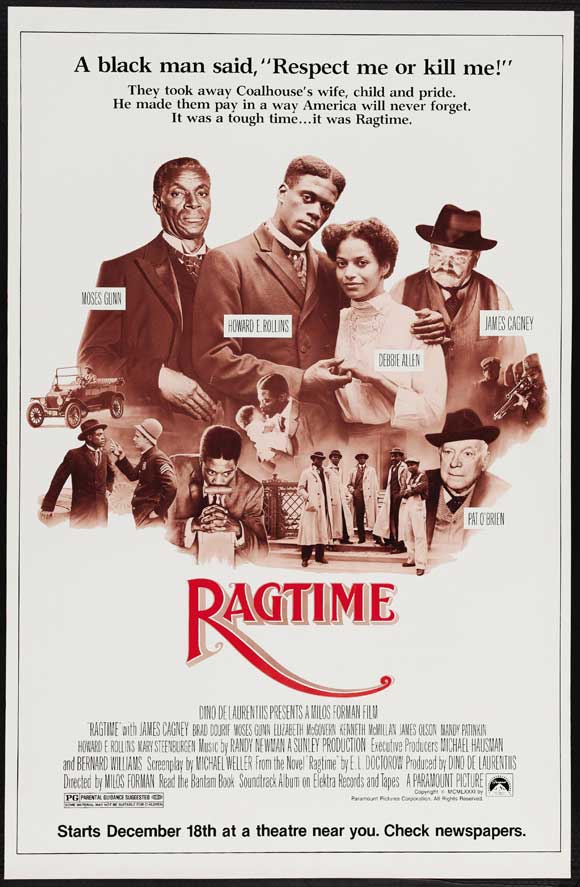 For Czech director Milos Forman, in that brief 10 year period between his two masterpieces, One Flew over the Cuckoo’s Nest and Amadeus, he took on two monumental American mini-institutions as sources. Hair, his film version of the groovy stage musical about the Age of Aquarius, is mildly memorable, while Ragtime, his big adaptation of E.L Doctorow’s hugely popular and influential novel, was largely ignored in its day; but 20-something years later it holds up and now looks like one of the most overlooked historical dramas of the decade. Ragtime is a film about the small details and how little incidents can grow and change history and people’s lives. With a fascinating cast and some interesting, ahead-of-its-time politics, Ragtime is truly an original and entertaining movie.
For Czech director Milos Forman, in that brief 10 year period between his two masterpieces, One Flew over the Cuckoo’s Nest and Amadeus, he took on two monumental American mini-institutions as sources. Hair, his film version of the groovy stage musical about the Age of Aquarius, is mildly memorable, while Ragtime, his big adaptation of E.L Doctorow’s hugely popular and influential novel, was largely ignored in its day; but 20-something years later it holds up and now looks like one of the most overlooked historical dramas of the decade. Ragtime is a film about the small details and how little incidents can grow and change history and people’s lives. With a fascinating cast and some interesting, ahead-of-its-time politics, Ragtime is truly an original and entertaining movie.
The film begins like the book: a sprawling story of scandal and trouble in the first decade of the 20th Century. It mixes real-life characters with fictional creations (similar to HBO’s Boardwalk Empire, the pulp work of James Ellroy, and countless books and films since). The famous murder trial of Harry Kendall Thaw (Robert Joy), who shot architect Stanford White (played well by overly macho writer Norman Mailer) over an affair with his wife, the showgirl Evelyn Nesbit (fresh out of Ordinary People, Elizabeth McGovern), dominates the first act. Meanwhile, a nice family just north of Manhattan in New Rochelle goes through massive changes. Mother (Mary Steenburgen) and Father (James Olson, an actor I wasn’t familiar with, who’s outstanding in this) try to keep their dignity while their Victorian values are constantly challenged. Her weird sibling, Younger Brother (Brad Dourif, less weird than usual, but still odd), works for Father at the fireworks factory and is obsessed with Evelyn, but she is too much the starlet for him. Meanwhile, Mother has taken in a black woman, Sarah (Debbie Allen), and her new baby. This is the thread plot that overtakes and dominates the story.
Midnight Cowboy
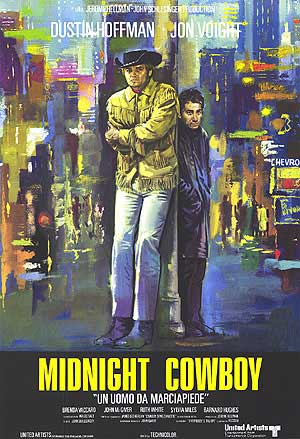 Though “X-rated” means something different than it did in 1969, it’s still a badge of honor that Midnight Cowboy is the only film with that “for adults only” label to have won the Best Picture Oscar (Last Tango in Paris being the other great “X-rated” flick of the era). Midnight Cowboy is less shocking today; sexually, it’s not the graphic images that provide the punch it’s the intellectually complicated nature of the characters’ sexuality that still can move an audience. As a follow up to The Graduate, Dustin Hoffman proved he was more than a one-hit wonder and instead that he had a long and vital career ahead of him. It also deservedly made a star out of a little known pretty-boy actor named Jon Voight. And it also put British director John Schlesinger on the American A-list, a guy whose deep sensitivity and open homosexuality put him ahead of his time. The film’s theme song, “Everybody’s Talkin’” performed by Harry Nilsson, has become the iconic standard bearer for images of a lonely guy walking the streets of New York. Midnight Cowboy also is a fascinating peek at an era both for representation for how an artist works at a time when the movie studios were willing to take a chance on a grubby flick about a would-be male prostitute and his new BFF while also revealing a dark side to the Big Apple during what has sometimes been considered a golden age of self-expression.
Though “X-rated” means something different than it did in 1969, it’s still a badge of honor that Midnight Cowboy is the only film with that “for adults only” label to have won the Best Picture Oscar (Last Tango in Paris being the other great “X-rated” flick of the era). Midnight Cowboy is less shocking today; sexually, it’s not the graphic images that provide the punch it’s the intellectually complicated nature of the characters’ sexuality that still can move an audience. As a follow up to The Graduate, Dustin Hoffman proved he was more than a one-hit wonder and instead that he had a long and vital career ahead of him. It also deservedly made a star out of a little known pretty-boy actor named Jon Voight. And it also put British director John Schlesinger on the American A-list, a guy whose deep sensitivity and open homosexuality put him ahead of his time. The film’s theme song, “Everybody’s Talkin’” performed by Harry Nilsson, has become the iconic standard bearer for images of a lonely guy walking the streets of New York. Midnight Cowboy also is a fascinating peek at an era both for representation for how an artist works at a time when the movie studios were willing to take a chance on a grubby flick about a would-be male prostitute and his new BFF while also revealing a dark side to the Big Apple during what has sometimes been considered a golden age of self-expression.
Apparently screenwriter Waldo Salt (who was just emerging from two decades of being blacklisted) took a lot of liberties with James Leo Herlihy’s underground but acclaimed novel. A Texas dishwasher named Joe Buck (Voight) decides to drop his apron and take advantage of his good looks; he busses up to Manhattan under the illusion that it’s a city full of rich women and fairies. They need a real cowboy to show them what a true man is. Unfortunately life in the big city doesn’t turn out like he hoped. There’s competition in the cowboy hustler department and most people are not charmed by his act. He does finally hook up with a seemingly wealthy older woman but when he requests payment for his services, she turns the tables and he ends up paying her. Similar trysts with two men, a religious nut and a teenage boy (a young Bob Balaban), prove fruitless as Joe is kicked out of his pad and finds himself cold, hungry, and homeless.
Bloody Sunday
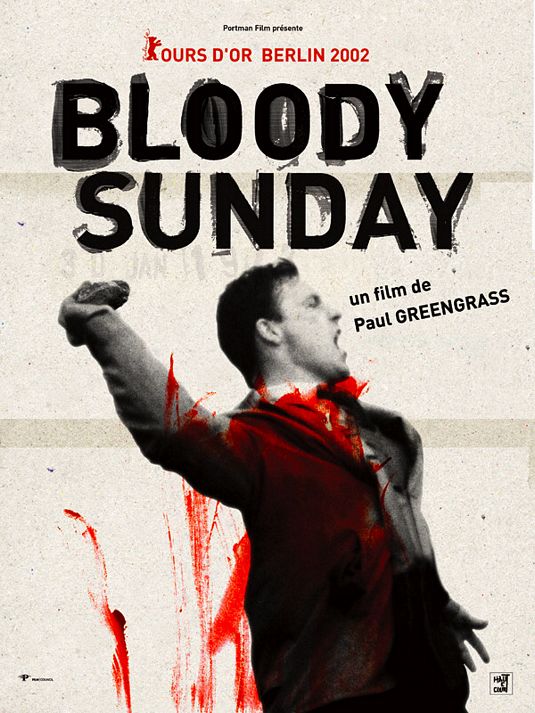 One of the best examples of docu-realism in the Battle of Algiers-mode, Bloody Sunday, from director and writer Paul Greengrass, was originally made for Granada Television (a high quality UK outfit) but after an acclaimed screening at the Sundance Film Festival it got its theatrical run and instantly made Greeengrass a director in high demand. He went on to direct the final two Bourne flicks as well as another outstanding docu-drama, United 93. Bloody Sunday tensely recreates the events of the 1972 peace march in the Bogside of Derry, Northern Ireland that spiraled out of control as itchy trigger fingered British paratroopers opened fire on marchers killing 14 and then covering their own actions. The film tries to show the points of view of both sides, but no matter how even-handed the film intended to be, and even with the usual IRA types running around looking for a fight, it’s impossible to see it as anything less than a British massacre of the innocent.
One of the best examples of docu-realism in the Battle of Algiers-mode, Bloody Sunday, from director and writer Paul Greengrass, was originally made for Granada Television (a high quality UK outfit) but after an acclaimed screening at the Sundance Film Festival it got its theatrical run and instantly made Greeengrass a director in high demand. He went on to direct the final two Bourne flicks as well as another outstanding docu-drama, United 93. Bloody Sunday tensely recreates the events of the 1972 peace march in the Bogside of Derry, Northern Ireland that spiraled out of control as itchy trigger fingered British paratroopers opened fire on marchers killing 14 and then covering their own actions. The film tries to show the points of view of both sides, but no matter how even-handed the film intended to be, and even with the usual IRA types running around looking for a fight, it’s impossible to see it as anything less than a British massacre of the innocent.
Inspired by the American civil rights movement, the Catholics of Northern Ireland lived in a near police state under British control; the marchers even used “We Shall Overcome” as their theme song. The march was led by their local MP, Ivan Cooper, ironically a Protestant himself leading a peaceful Catholic rebellion. As played brilliantly by James Nesbitt, Cooper is the epitome of good intentions in a bad situation; he often references his idol Martin Luther King and does everything he can do to keep his marchers peaceful, but unfortunately for him this is Northern Ireland not Selma. The Northern Ireland-born Nesbitt, a staple on UK TV, was mostly known for lightweight fare like the show Cold Feet; here he gives the performance of his career. It’s a stunning piece of acting; Cooper is desperate to lead, but the weight of events is just too overpowering for him and Nesbitt earns the viewer’s respect while our hearts go out to him.
Tuff Turf
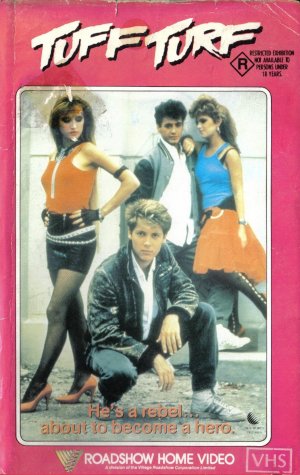 Like a stunned archaeologist I happened upon a relic from the past that may be a Holy Grail for shining light on an era and a people; it’s a little movie called Tuff Turf. Perhaps it can be used not to tell us about life in 1985 — I imagine that any relation to actual life is purely coincidental — no, it tells us more about the hack filmmakers of that period. Like so many films about young people in that period, the filmmakers are highly influenced by the worst qualities of music videos and seem intent on filling the movie with banal musical interludes. It’s a mix of Class of 1984 and Footloose (which obviously includes some Rebel without a Cause), mixing in live performances but without the skill of Streets of Fire. Yes, it’s supposed to be a gritty school gang vs. the new guy flick, but where flicks like Class of 1984 and even Bad Boys were legitimately disturbing, even with some heavy moments of violence Tuff Turf carries the influential stamp of Grease 2, or worse, ‘60s beach movies. There’s actually a shocking moment when the kids break out in a spontaneous, highly choreographed dance number (no, really); any state of edge in the film is an accident. Oh, and the editing and timing are completely stilted and awkward. However, these minor grievances aside, Tuff Turf is a bad film; as a matter of fact its severe mediocrity actually makes it all the more fascinating and entertaining.
Like a stunned archaeologist I happened upon a relic from the past that may be a Holy Grail for shining light on an era and a people; it’s a little movie called Tuff Turf. Perhaps it can be used not to tell us about life in 1985 — I imagine that any relation to actual life is purely coincidental — no, it tells us more about the hack filmmakers of that period. Like so many films about young people in that period, the filmmakers are highly influenced by the worst qualities of music videos and seem intent on filling the movie with banal musical interludes. It’s a mix of Class of 1984 and Footloose (which obviously includes some Rebel without a Cause), mixing in live performances but without the skill of Streets of Fire. Yes, it’s supposed to be a gritty school gang vs. the new guy flick, but where flicks like Class of 1984 and even Bad Boys were legitimately disturbing, even with some heavy moments of violence Tuff Turf carries the influential stamp of Grease 2, or worse, ‘60s beach movies. There’s actually a shocking moment when the kids break out in a spontaneous, highly choreographed dance number (no, really); any state of edge in the film is an accident. Oh, and the editing and timing are completely stilted and awkward. However, these minor grievances aside, Tuff Turf is a bad film; as a matter of fact its severe mediocrity actually makes it all the more fascinating and entertaining.
Understanding what motivates the lead character Morgan Hiller is a challenge for viewers because he’s played by a young James Spader, who even in his best performance (Sex, Lies, and Videotape) can come off as aloof and odd, as if he’s Christopher Walken’s prettier younger brother. After a long music video credit sequence, the film opens with a group of Los Angeles Valley teen toughs straight out of Michael Jackson’s “Beat It” video, mugging a civilian. The hair-sprayed bandanna gang is led by big-chested Nick (thirty-something looking Paul Mones) and his devoted main squeeze, Frankie (child star later turned reality TV mess, Kim Richards). Morgan rides his bike, whistling past the gang spray painting their faces and ruining their crime. Is he some kind of teen vigilante? Nope, just an East Coast rich kid who relocated to L.A. after his family fortune went bust. Now this former prep school rebel has to figure out how to fit in at a rough public school; it didn’t help to make enemies with Nick and his crew. Even after they publicly mess up his bicycle the nearly fearless Morgan continues to woo the much more “street” Frankie, pushing Nick’s wrath even further.
The King of Marvin Gardens
"Get your ass down here fast. Our kingdom has come."
—Jason Staebler's enthusiastic message to his younger brother David characterizes the delusions of grandeur in Bob Rafelson's 1972 film.





